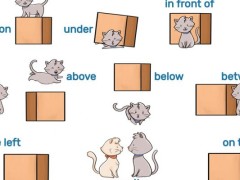year [jiə] n. 年
【派】yearly 每年的
【扩】month 月 week 周
【搭】every year 每一年 new year 新年
* * *
A: Maybe next year, we should have the funds to reward you.
B: I can't wait until next year.
A:到明年吧!那时候我想我们会有基金来奖赏你的。
B:我没办法等到明年。
* * *
race [reis] n. 比赛
【派】racing 赛车
【扩】game 比赛 match 比赛
【搭】relay race 接力赛
* * *
A: Hill was in the lead from the beginning of the race.
B: I hope he will win the match.
A:希尔比赛一开始就跑在前面。
B:希望他能赢得比赛。
* * *
town [taun] n. 城镇
【派】hometown 故乡
【扩】umland 郊区,城镇
【搭】downtown 市中心,繁华区
town center 城镇中心
* * *
A: Living in the small town is very peaceful.
B: Yes, but there are more chances in the city.
A:住在小城镇很宁静。
B:是的,但是大城市机会更多。
* * *
crowd [kraud] n. 人群
【派】crowded 拥挤的
【搭】a crowd of people 一群人
in crowds 成群的
* * *
A: Look, there is a big crowd here tonight.
B: Yes, the show will soon begin.
A:看,今晚这儿人真多。
B:是的,演出马上就要开始了。
* * *
stand [stænd] v. 站立
【派】standby 候补
【扩】lie 躺着
【搭】stand up 起立 stand for 代表
stand by 袖手旁观
* * *
A: Stand behind the line and wait for your turn, please.
B: Sorry, I didn't notice the line just now.
A:请站在线后等着轮到你。
B:对不起,我刚才没有注意到那条线。
* * *
exciting [ikˈsaitiŋ] adj. 使人激动的
【派】excitement 激动 excited 令人激动的
【搭】exciting news 激动人心的消息
* * *
A: I'd expected it to be more exciting.
B: You felt disappointed, right?
A:我本希望它会更加精彩的。
B:你感到很失望对吗?
* * *
just [dʒʌst] adv. 正好,恰好
【派】justice 公正
【搭】just then 就在那个时候
* * *
A: She just did a big spring-cleaning for the New Year.
B: No wonder the room is so clean.
A:她刚为新年做过春季大扫除。
B:难怪这屋里那么干净。
* * *
finish [ˈfiniʃ] n. 结尾,结束
【派】finished 完成的
【扩】complete 完成
【反】beginning 开头
【搭】finish doing sth. 完成某事
* * *
A: Without us, the ad can not be finished so smoothly.
B: You can say so. But the line is the most critical as we all know.
A:没有我们,那个广告不可能完成得如此顺利。
B:可以这么说,不过大家都知道,创意才是最重要的呀。
* * *
winner [ˈwinə] n. 获胜者
* * *
A: Who will be the winner?
B: It's hard to say. Let's watch the game and wait for the answer.
A:谁将会是获胜者?
B:这不好说,我们还是看比赛等待答案吧。
* * *
behind [biˈhaind] prep. 在……之后
* * *
A: He often does morning exercises in the garden behind his house.
B: I didn't know there is a garden there before.
A:他经常在他房子后面的花园里晨练。
B:以前我都不知道那儿有一个花园。
* * *
way [wei] n. 路途
Lesson 70 When were they there? 他们是什么时候在那里的?
stationer [ˈsteiʃənə] n. 文具商
【派】stationery 文具
【扩】ink 墨水 correction fluid 修正液
【搭】at the stationer's 在文具店
* * *
A: How are you going to the stationer's?
B: I want to go there by bike.
A:你打算怎么去文具店?
B:我想骑自行车去。
* * *
Denmark [ˈdenmɑːk] n. 丹麦
noun [专属名词]年,日历年;年,一年时间;与某事相关的一年,年度;学年;年级,某年纪的学生;年龄,年纪,岁;很久,好长时间;年代,时代;年级,某年级的学生 - The year was 1840.
- in 1998 1998 年
- in 2019 2019 年
- the year of the snake 蛇年
- the year of the pig 猪年
- the year of the monkey 猴年
- this year 今年
- last year 去年
- It is the year of the pig and it was the year of the dog. 今年是猪年,去年是狗年。
noun [具体名词]赛跑,速度竞赛;竞争,角逐;赛马会(the races);人种,种族;民族;(动植物)种,属;(具有共同特征的)一群(或一批)人(或物);急流;沟槽,通道;<古>血统,门第 - The women's race was won by the only American in the field, Patti Sue Plumer.
verb [vi. 不及物动词](和…)比赛,参加比赛;使(动物或车辆)参赛参赛;(使)快速移动,快速运转;疾走,全速行进;竞相,赶(时间);(因害怕、兴奋而)急速跳动,快速转动;(发动机)猛转 - In the 10 years I raced in Europe, 30 drivers were killed.
比速度
- a car race 汽车比赛
- a boat race 划船比赛
- a running race 赛跑
球类比赛
- a football match
- a basketball match…
noun [专属名词]城镇,市镇; (生活、工作或刚提到的)城镇;(城镇的)商业区,中心区;全体镇民,全镇人;城市生活(与乡村生活相对);镇政府 - The town takes immense pride in recent achievements.
noun [专属名词]市中心:指城市的商业、文化和娱乐设施集中的地区。 - We went down town to do some Christmas shopping and all the world and his wife were there.
noun [集合/集体]人群;一伙人;百姓,凡夫俗子;(尤指体育运动赛事的)观众,听众 - A particular crowd is a group of friends, or a set of people who share the same interests or job.
verb [vt. 及物动词]聚集,群集;靠近,盯着;催促,催逼(因而把人激怒或惹恼);挤满,塞满 - When people crowd around someone or something, they gather closely together around them.
| n. 人群 |
|
|---|---|
| vt./vi. 拥挤, 挤满、聚集 |
|
verb [vi. 不及物动词]站立,直立;起立,站起来;使直立,竖放;位于(某处或某位置);高度为,高达;处于(某种状态);停,停靠;停滞,不流动,放着不动;很可能会;持有(某种态度或看法);达特定水平(或数量、高度等);保持有效,维持不变;忍受,容忍;经得起,经受 - She was standing beside my bed staring down at me.
noun [专属名词]架,座,台;立场,见解;货摊,售货亭;反抗,抵抗;(体育场的)看台;摊位,展台;证人席;(在一局板球赛中两个击球员的)坚守时间,总计得分;出租车站,公共汽车站;林分 - He felt the need to make a stand against racism in South Africa.
adjective [原级]令人兴奋的,令人激动的;惊险刺激的(尤指无法预知下一步将发生什么) - The race itself is very exciting.
verb [vi. 不及物动词]使兴奋,使激动;激发,引起(excite 的现在分词形式) - "Golly," he says, "Isn't it exciting!"
exciting adj. 令人兴奋的;
-ing: 令人感到
- an exciting trip 令人兴奋的旅行
- exciting news 令人兴奋的新闻
excited adj. 兴奋的
-ed: 自己感到
- The news is exciting.(这则新闻令人兴奋。)
- exciting boy 令人兴奋的男孩
- I am excited.(我很兴奋。)
excite v. 激动(这类动词的宾语一定是人,让后面的人感到……)
- The news excited me.(那则新闻让我感到激动。)
interesting adj. 令人感到有趣的;interested adj. 感到有兴趣的
- interesting man 有趣的男人
- The man is interesting.(这个男人很有趣。)
interest v. 对……感兴趣
- The book interests me.(这本书对我很有趣。)
noun [抽象名词]出口,通道,太平门;(车辆驶出公路的)出路;离去;退出;<文>去世,死亡 - He picked up the case and walked toward the exit.
verb [vt. 及物动词]退出(电脑程序);退场(剧本里的舞台指示);<文>去世,死亡;摊牌让分;离去 - She exits into the tropical storm.
adverb [时间副词]正好,恰好;正当…时;不少于,同样;差一点就不,勉强;刚才,刚刚;正在,正要;只是,仅仅是;确实,完全;请,就;可能,也许;表示赞同 - If you say that you are just doing something, you mean that you are doing it now and will finish it very soon. If you say that you are just about to do something.
adjective [原级]正义的,公平的;应得的,合理的;正确的,精确的 - If you describe a situation, action, or idea as just, you mean that it is right or acceptable according to particular moral principles, such as respect for all human beings.
verb [vi. 不及物动词]完成,做好;(使)结束;消耗尽(所剩之物);(比赛中)获得(名次);(英式足球用语)进球;对(物件)做最后加工;杀死,歼灭;使精疲力竭;<旧>为(少女)进入上流社会做好准备;<非正式>使精疲力竭 - As soon as he'd finished eating, he excused himself.
noun [抽象名词]结尾,结局;(赛跑、比赛的)终点;最后精细加工;饰面,饰面材料;(葡萄酒或啤酒的)余味 - I intend to continue it and see the job through to the finish.
adjective [原级]完成的;煮熟的;不再发生的;为社会所接受的,得体的;上当受骗的;筋疲力尽的 - When her deal is done, the client emerges with her purchase.
interjection [惊讶]行,好 - You say "Done" when you are accepting a deal, arrangement, or bet that someone has offered to make with you.
verb [vi. 不及物动词]做(do 的过去分词形式) - I haven't done a thing all day.
noun [专属名词]获胜的人(或队、动物等),优胜者;(体育比赛中)致胜的一分,制胜的进球;<非正式>可能成功的人(或事物),极好的人(或事物),成功的人(或事物);获益者,赢家;(桥牌)能赢的牌 - She will present the trophies to the award winners.
noun [专属名词]【名】 (Winner)(美、德、英)温纳(人名) - The winner gets first pick of the prizes.
preposition [位置和方向]在…后面;跟在…后面;落后于;低于;成为(某人的)过去;不再想,忘掉;是…产生的原因;支持;在…背后(指表象背后的真实情况,某人表面行为背后的真实性格);幕后(指导,操纵或负责)的;在…死后;(经验)为…拥有;对…负责;在…的另一侧;在…身后(随手关上门);晚于,慢于 - I put one of the cushions behind his head.
adverb [地点副词]在后面;落在后面;留在原地;(在比赛中)落后;迟,晚;拖欠,不按时;(学生放学后)留堂 - The rapid development of technology means that she is now far behind, and will need retraining.
noun [专属名词]<非正式>屁股;(澳橄)射门得分 - Myra and Sam and the children were driving behind them.
noun [抽象名词]方法,手段;习俗,习惯,行为方式(ways);(行事)作风,(某事发生的)方式;道路,路线;方向;…路(用于道路的名称);出入通道,门口;距离,时段;方面;可能作出的决定;情况,状态;(某人居住的)地区,地方;(分成的)部分(ways); 前进,进程;<苏格兰,正式>职业,行当;(船)航行,动力;(船下水用的)船台,滑道(ways) - Freezing isn't a bad way of preserving food.
adjective [原级]途中的 - He had to walk all the way home.
adverb [方式副词]大大地,远远地;<美>非常,很 - There is no reason why an aircraft designer should also be a good pilot. In the same way, a good pilot can be a bad driver.
作为名词:
- 表示方法、方式、途径:例如,There is no easy way to solve this problem.(解决这个问题没有简单的方法。)
- 表示道路、路径:例如,He lives just a few minutes' walk from here, down that way.(他离这里只有几分钟的步行路程,往那个方向走。)
- 表示距离、路程:例如,It's a long way from here to the airport.(从这里到机场有很远的距离。)
- 表示方向或位置:例如,Can you show me the way to the nearest post office?(你能告诉我去最近的邮局的路吗?)
作为副词:
- 表示远离某处:例如,Please step aside and let me through.(请让开,让我过去。)
- 表示某种程度或情况:例如,The party was way too crowded.(聚会人太多了。)
构成复合词:
- Any way: 无论如何
- By the way: 顺便说一下
- In no way: 决不
- On the way: 在路上
- By way of: 经由
需要注意的是,"way"还可以在其他短语和表达中使用,这只是其中一些常见的用法。具体用法要根据上下文来确定其意义。
noun [专属名词]文具店;文具商 - Please let me introduce him, the boss of this stationer.
在文具店:at the stationer’s
在肉店:at the butcher’s
在蔬菜水果店:at the greengrocer’s
noun [专属名词]丹麦(欧洲国家) - Denmark recycles nearly 85% of its paper.















